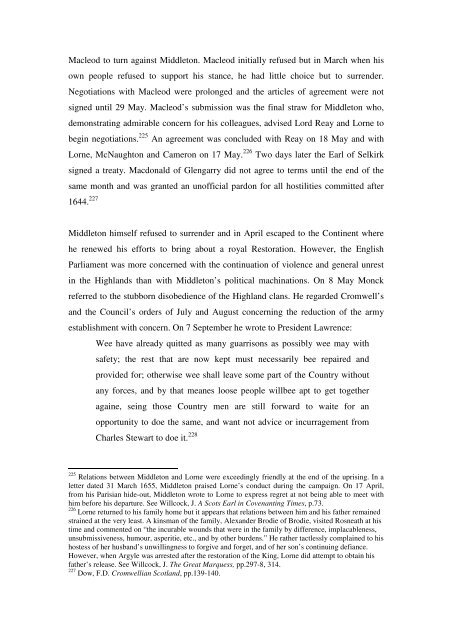The Glencairn Uprising, 1653-54 Helen Baker Department of ...
The Glencairn Uprising, 1653-54 Helen Baker Department of ...
The Glencairn Uprising, 1653-54 Helen Baker Department of ...
Create successful ePaper yourself
Turn your PDF publications into a flip-book with our unique Google optimized e-Paper software.
Macleod to turn against Middleton. Macleod initially refused but in March when his<br />
own people refused to support his stance, he had little choice but to surrender.<br />
Negotiations with Macleod were prolonged and the articles <strong>of</strong> agreement were not<br />
signed until 29 May. Macleod’s submission was the final straw for Middleton who,<br />
demonstrating admirable concern for his colleagues, advised Lord Reay and Lorne to<br />
begin negotiations. 225 An agreement was concluded with Reay on 18 May and with<br />
Lorne, McNaughton and Cameron on 17 May. 226 Two days later the Earl <strong>of</strong> Selkirk<br />
signed a treaty. Macdonald <strong>of</strong> Glengarry did not agree to terms until the end <strong>of</strong> the<br />
same month and was granted an un<strong>of</strong>ficial pardon for all hostilities committed after<br />
1644. 227<br />
Middleton himself refused to surrender and in April escaped to the Continent where<br />
he renewed his efforts to bring about a royal Restoration. However, the English<br />
Parliament was more concerned with the continuation <strong>of</strong> violence and general unrest<br />
in the Highlands than with Middleton’s political machinations. On 8 May Monck<br />
referred to the stubborn disobedience <strong>of</strong> the Highland clans. He regarded Cromwell’s<br />
and the Council’s orders <strong>of</strong> July and August concerning the reduction <strong>of</strong> the army<br />
establishment with concern. On 7 September he wrote to President Lawrence:<br />
Wee have already quitted as many guarrisons as possibly wee may with<br />
safety; the rest that are now kept must necessarily bee repaired and<br />
provided for; otherwise wee shall leave some part <strong>of</strong> the Country without<br />
any forces, and by that meanes loose people willbee apt to get together<br />
againe, seing those Country men are still forward to waite for an<br />
opportunity to doe the same, and want not advice or incurragement from<br />
Charles Stewart to doe it. 228<br />
225 Relations between Middleton and Lorne were exceedingly friendly at the end <strong>of</strong> the uprising. In a<br />
letter dated 31 March 1655, Middleton praised Lorne’s conduct during the campaign. On 17 April,<br />
from his Parisian hide-out, Middleton wrote to Lorne to express regret at not being able to meet with<br />
him before his departure. See Willcock, J. A Scots Earl in Covenanting Times, p.73.<br />
226 Lorne returned to his family home but it appears that relations between him and his father remained<br />
strained at the very least. A kinsman <strong>of</strong> the family, Alexander Brodie <strong>of</strong> Brodie, visited Rosneath at his<br />
time and commented on “the incurable wounds that were in the family by difference, implacableness,<br />
unsubmissiveness, humour, asperitie, etc., and by other burdens.” He rather tactlessly complained to his<br />
hostess <strong>of</strong> her husband’s unwillingness to forgive and forget, and <strong>of</strong> her son’s continuing defiance.<br />
However, when Argyle was arrested after the restoration <strong>of</strong> the King, Lorne did attempt to obtain his<br />
father’s release. See Willcock, J. <strong>The</strong> Great Marquess, pp.297-8, 314.<br />
227 Dow, F.D. Cromwellian Scotland, pp.139-140.
















